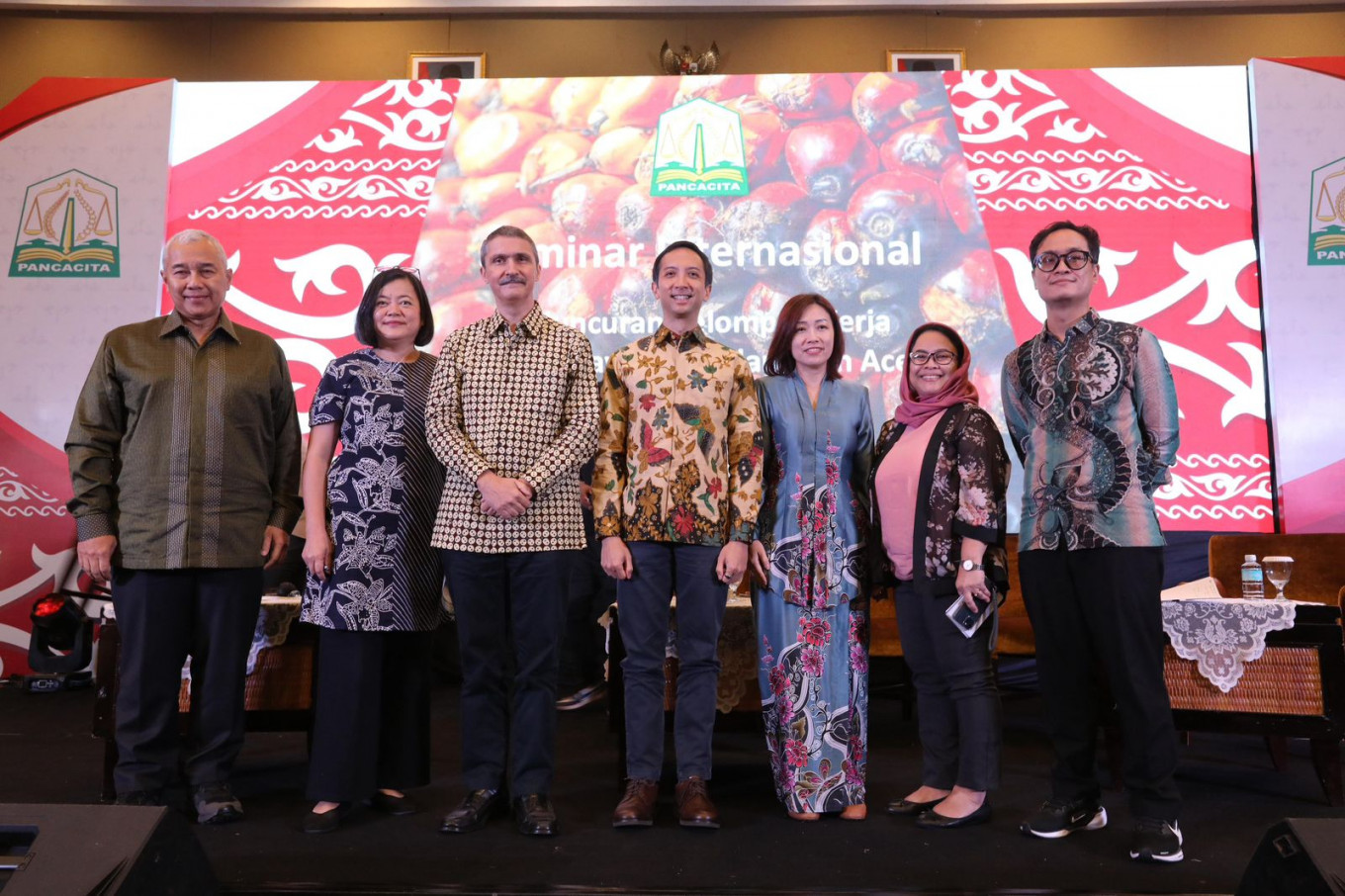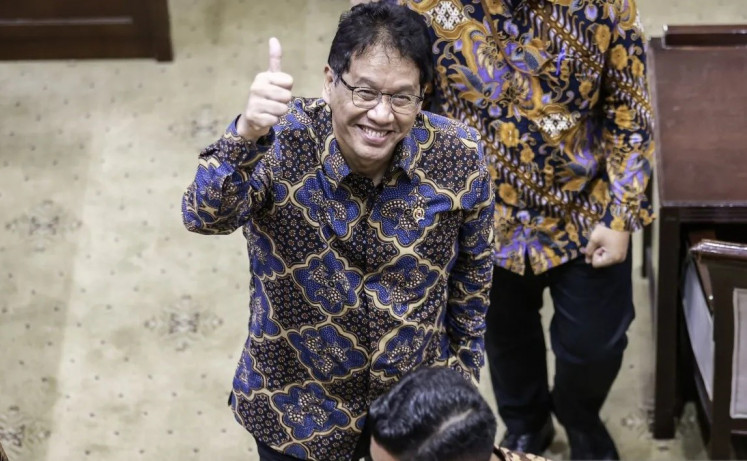Popular Reads
Top Results
Can't find what you're looking for?
View all search resultsPopular Reads
Top Results
Can't find what you're looking for?
View all search resultsApical reaffirms commitment to economic growth, ecosystem conservation with SLV program
Change text size
Gift Premium Articles
to Anyone
L
eading vegetable oil processor Apical Group has reinforced its commitment to balancing economic growth, community welfare and ecosystem conservation through its Sustainable Living Village (SLV) program.
First launched in January 2023 in Aceh Singkil regency, Aceh, and then expanding in September 2024 to East Kutai regency, East Kalimantan, the SLV program is designed to foster sustainable livelihoods, aiming to create a business-friendly, positive community-forest relationship model that is commercially viable for upscaling at both the village and landscape levels.
The program is designed with a holistic approach and focuses on four key priorities: improving community livelihood resilience through empowerment, promoting forest protection and conservation, encouraging supply chain transformation and strengthening collaboration with local governments and stakeholders.
In Aceh, the SLV program is implemented at six villages through a collaboration between Apical Group, the Sustainable Trade Initiative (IDH), the Sustainable Ecosystem Foundation (YEL) and the Leuser Conservation Forum (FKL), as well as the Aceh Singkil regency government. In the district of Bengalon in East Kutai regency, the program is coordinated in partnership with Earthworm Foundation (EF) at three villages.
“By empowering smallholders, we ensure that sustainability is embedded at every level of the supply chain. It will also provide ongoing support on certification to ensure that sustainability is maintained over time,” says Tor Mooi See head of sustainability at Apical Group.
“This continuity is crucial for smallholders to not only meet but also exceed sustainability standards and improve their economic resilience.”
Reaching milestones
In both regions, Apical Group works hand in hand with villagers to build sustainable livelihoods, combining practical training on sustainable oil palm practices, legal land support and tree planting.
One of the program’s main focus areas is environmental conservation through consistent reforestation.
In pursuing its long-term target of planting 90,000 trees across East Kutai over three years, Apical Group has successfully planted 30,000 trees during the first year of the SLV program. This initiative continued on July 9, 2025, when an additional 2,000 trees were planted to kick off the program’s second year.
In addition, 2,000 trees have been planted in the restoration area of Teluk Rumbia village in Aceh Singkil. This effort is expected to strengthen the hydrological cycle, improving vegetation cover and creating natural corridors for wildlife, while also providing long-term economic potential for the local community.
"Restoration is a long-term investment. With active community participation, we ensure the sustainability of restored land while supporting the local economy," observes M. Yakob Ishadamy, YEL's director of conservation.
Empowering communities
(Courtesy of Apical)To further support economic sustainability, smallholders are also encouraged to diversify their livelihoods through initiatives such as cultivating trigona honey in Aceh Singkil and cocoa in East Kutai, which can increase their income sources while helping to reduce pressure on forest areas.
Syafii Rambe, the head of the Benben Madu Biskang cultivation group in Biskang Village, joined the Aceh Singkil trigona honey cultivation program in January 2024. He was already interested in cultivating honey, but the program gave him a nudge as he feels it is a good opportunity to learn and supplement his income.
“I’m a smallholder in Biskang Village with a field that’s slightly under 3 hectares. People used to free up new land by going through the forests, but now more people understand the importance of taking care of the protected forests surrounding the village. This program has been very helpful in not only highlighting the role of the forests, but also teaching us how to manage our own existing fields to be more productive instead of constantly expanding,” he said.
According to Syafii, the program’s impact is best seen through his cultivation group’s income. Every three months, the group would harvest the honey to be packaged in 120 milliliter bottles and sold for Rp 80,000 each, which he said is enough to help support the community.
“My hope is that the SLV program can continue to grow and be accepted by everyone in Biskang Village. Once I complete this program, I want the program to become a real source of income for my family, not just a supplement, so we don’t have to depend only on the palm-oil harvest.”
Along with environmental action, the SLV program also prioritizes capacity building for oil palm smallholders, particularly in good agricultural practice (GAP) and best management practice (BMP).
In terms of GAP, smallholders are encouraged to adopt efficient, safe and environmentally friendly cultivation practices. Meanwhile, BMP translates these principles into operational steps on plantations, from balanced fertilization and integrated pest control to good recordkeeping.
To date, the SLV program has provided GAP and BMP training to over 1,000 smallholders in Aceh Singkil. In East Kutai, 459 independent smallholders participated in BMP training during the program’s first year, far exceeding the original target of 150. The second year began on July 8 with advanced training in Tepian Indah village, where 26 smallholders learned techniques for selecting superior seeds and proper methods for maintaining oil palm nurseries with Earthworm Foundation.
Progress is also evident in legal aspects, with the SLV program assisting smallholders in obtaining a cultivation registration certificate (STD-B) as formal recognition of their businesses. STD-B certification is key to accessing formal financing, strengthening their bargaining position with offtakers and a crucial requirement for subsequent certifications such as ISPO and RSPO.
In Aceh Singkil, more than 500 smallholders have obtained electronic cultivation registration certificates (e-STDBs), while in East Kutai, STDB certification has been issued to 88 out of 500 smallholders targeted over the course of three years.
"Well-managed land legality is key to inclusive supply chain traceability and access to financing and other resources," said Nassat Idris, country director at IDH Foundation.
"With the e-STDB, independent smallholder farmers can become part of the global supply chain and achieve better sales value."
Collective effort
The SLV program is a concrete manifestation of Apical's 5C philosophy, “Good for Community, Country, Climate, Customer and Company”, which encourages synergy between companies, government and communities to build resilient villages and a greener, more sustainable future.
This approach is apparent in how Apical has joined leading industry players and IDH Foundation to launch the Aceh Sustainable Palm Oil Working Group, a voluntary, nonexclusive and nonbinding collaboration to advance sustainable palm oil production across Aceh province, supporting the Aceh Governor’s Sustainable Palm Oil Road Map (Gubernatorial Regulation No. 9/2024) by promoting deforestation-free, smallholder-inclusive palm oil.
The governor’s road map lays out a balanced vision: Strengthen Aceh’s economic potential while protecting forests and community rights. Key priorities include increasing smallholder productivity and incomes, expanding local revenue, reducing deforestation risk, restoring degraded land, resolving land-related conflicts and ensuring stronger protection of community rights.
Apical Group believes that by working together with government, industry and civil society, Aceh can set an example for the world in producing palm oil that benefits people, protects the planet and strengthens the local economy.












